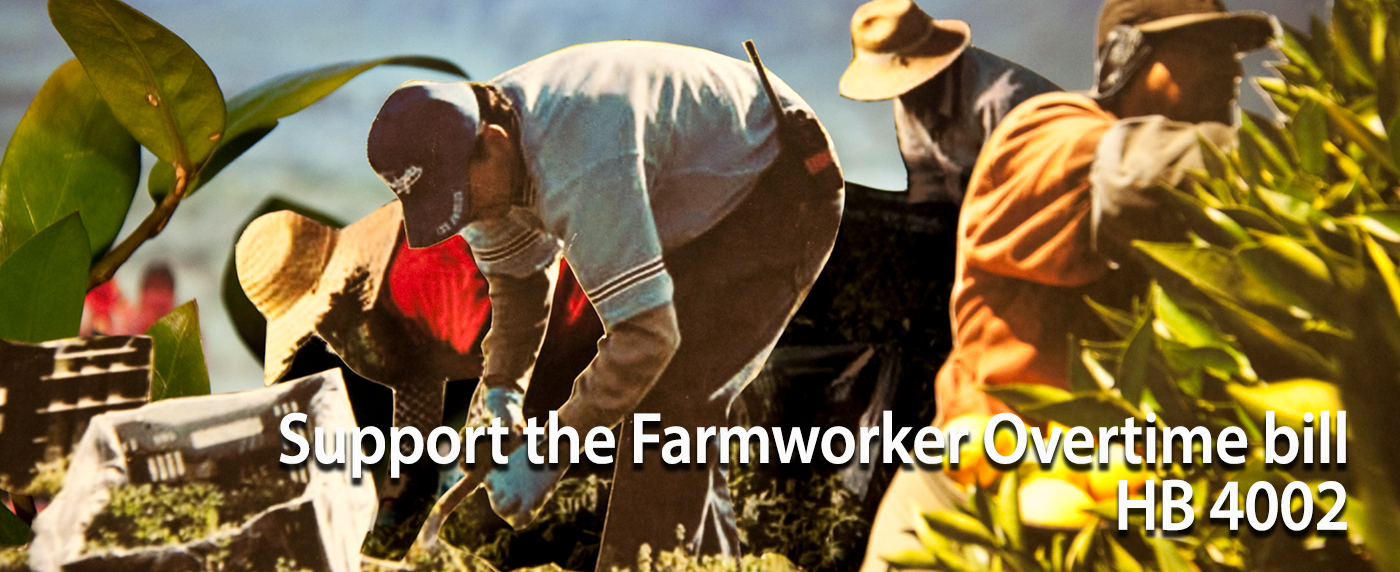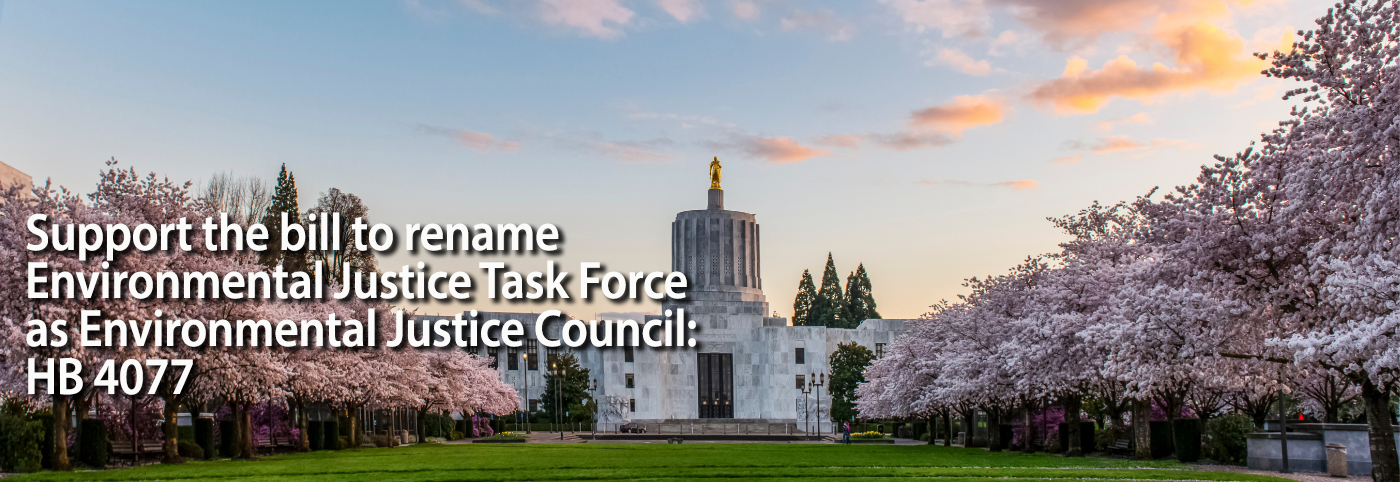Beyond Toxics 2022 Legislative Agenda
BREAKING NEWS
SB 1567 : The Energy Infrastructure Resilience Bill - PASSED
SB 1501 & SB 1502: The Private Forest Accord Package - PASSED
SB 1536-B: The Emergency Heat Relief Package - PASSED
Bills We Suppport
HB 4002
FINAL RESULT: PASSED
Title: Farmworker Overtime | Relating to overtime for agricultural workers; prescribing an effective date.
Description: Prohibits employers from permitting or requiring agricultural workers to work in excess of maximum allowable hours unless workers are compensated for overtime hours worked.
Find out more about why Oregon Farmworkers Need Overtime Compensation->>
Chief Sponsors: Representative Salinas, Holvey, Senator Taylor, Representative Valderrama, Senator Frederick, Jama, Manning Jr, Wagner
Our position: Farm workers play a vital role in the American economy. Farm workers collect, package, and maintain the bulk of our nation’s food products and they are subject to the same psychological, physiological, and social impairments as workers performing overtime in any other occupation. However, they face the additional compounding burdens of financial strain, job insecurity, and housing instability. Farm work requires long hours, yet these workers continue to be excluded from protections under the Fair Labor Standards Act (FLSA).
New rules are needed in Oregon to better protect Oregon's farm workers from unfair labor practices. Beyond Toxics has joined with our partners at Pineros Y Campesinos Unidos del Noroeste (PCUN: Oregon's farm worker union) to educate Oregonians about this injustice and bring the related issues to the attention of our elected leaders in state government. We stand with PCUN in recognizing that Oregon farmeworkers deserve to be paid for every hour of their essential, difficult, and often dangerous work.
Read the testimony from Beyond Toxics for HB 4002
HB 4052
FINAL RESULT: PASSED
HB 4052 passed in the Senate’s third reading with 22 Ayes, 3 Nays, 2 absent and 3 excused and is currently awaiting the Governor’s signature.
Title: Relating to equity; declaring an emergency.
Description: Requires Oregon Health Authority to provide grants to operate two culturally and linguistically specific mobile health units, as pilot program, to serve priority populations with histories of poor health or social outcomes.
Chief Sponsors: Representative Salinas, Prusak, Nosse, Nelson, Reynolds
Our position: HB 4052 is a historic piece of legislation that recognizes the history of systemic racism in Oregon, its lasting impacts on the health of Black, Indigenous, and people of color (BIPOC), and works to redress these harms. This bill will also ensure that communities who may experience post-fire health impacts have equitable access to culturally-appropriate healthcare. | Read the testimony from Beyond Toxics for HB 4052
Read more about what the bill will do below...
ake
MORE on what HB 4052 will do:
The bill will establish an advisory committee convened by the Oregon Health Authority to provide guidance on building, funding and operating a pilot program to improve the health outcomes of communities impacted by racism. Eligible entities will receive a grant to operate two culturally and linguistically specific mobile units in Oregon, which will provide relevant information regarding populations served by race, ethnicity, language, disability, sexual orientation and gender identity to inform the potential expansion of the pilot program statewide. A final report of the study must be submitted by June 30, 2026.
The bill will also create affinity group task forces as a result of a collaboration between Oregon Advocacy Commissions Office and culturally specific community-based organizations consisting of leaders of Black and indigenous communities, people of color and members of the nine federally-recognized tribes in Oregon. The task forces will discuss and research specific needs of the communities they represent and develop recommendations for specific allocations of resources to address the communities’ needs and health inequities. The OHA will use this information to develop funding recommendations for intervention programs that are culturally- and linguistically-specific, across all relevant state agencies. These interventions will focus on aspects of the social determinants of health including housing, access to food, neighborhood safety, education, transportation and involvement with the criminal justice system.
HB 4077-A
FINAL RESULT: PASSED
HB 4077 passed in the Senate’s third reading with 19 Ayes, 7 Nays, 1 absent and 3 excused and is currently awaiting the Governor's signature.
See the press release about HB 4077 from the Unite Oregon and Oregon Just Transition Alliance (PDF)
Title: Relating to environmental justice; prescribing an effective date.
Description: Renames Environmental Justice Task Force as Environmental Justice Council.
Chief Sponsors: At the request of Governor Brown
Our position: Beyond Toxics supports HB 4077-A relating to expanding the capacity and essential work of the Environmental Justice Task Force (EJTF). Beyond Toxics has regularly attended EJTF meetings for the past seven years to witness the growing influence the Task Force has made to raise the profile of environmental justice issues, identify the gaps in state policy and lift up the voices of under-represented communities of color in Oregon. However, throughout these years, the Task Force has been underfunded and understaffed, making it difficult for this advisory body to follow through on its essential functions. Such underinvestment reverberates outwards to our communities, harming people who already experience vulnerability and reducing their capacity to participate in the decisions that will shape the future of our environment and economy.
Read the testimony from Beyond Toxics for HB 4077-A
MORE on what HB 4077 will do:
HB 4077 has two main sections, the first refers to the name change of the “Environmental Justice Task Force” to “Environmental Justice Council” and its establishment within the office of the Governor, including streamlining the new name within the statutory law. The council will consist of 13 members appointed by the Governor, where eight members must have expertise in environmental justice as well as in at least one of the following categories: climate change, environmental laws, natural resources management, land use planning and development, sustainability, community organizing, civil rights and disability rights, environmental health, energy, agricultural operations and food systems, water planning and management or forest management. Four members will be nominated by commissions of vulnerable communities and the last member of the council will represent the youth, who must be at least 16 but no more than 24 years of age when appointed.
The Bill will develop an environmental justice mapping tool by September 15, 2025. The development of this mapping tool will be led by the Environmental Justice Council with staff support from the Department of Environmental Quality, and in collaboration with the Office of Enterprise Information Services, the Institute for Natural Resources, the Portland State University Population Research Center, and natural resource agencies with staff support from the department and the Oregon Health Authority. The mapping tool will assess environmental, health, and socioeconomic disparities. The tool will layer together data such as air emissions, ozone level, and toxic hazards with health-related data and socioeconomic information such as linguistic isolation and income levels to help state agencies better understand the impacts of environmental disparities. Data from the mapping tool will be accessible to lawmakers, community organizations, and the public to assist in decision-making in environmental program development, implementation, and funding.
Oregon Legislature Passes Private Forest Accord Package with Bipartisan Support!
The Private Forest Accord has passed out of the legislature and now goes to the Governor's desk! This includes SB 1501 (the main bill), SB 1502 (small forestland owner tax credit), HB 4055 (harvest tax for mitigation fund). After the passage of the Private Forest Accord package, Senate Bills 1501 and 1502 and House Bill 4055, Governor Kate Brown issued the following statement:
“Thank you to legislators from both parties for coming together to pass this historic legislative package. The Private Forest Accord is a perfect example of the Oregon Way––Oregonians coming together to find common ground, to the mutual benefit of us all,” said Governor Brown. “Together, this agreement will help to ensure that Oregon continues to have healthy forests, fish, and wildlife, as well as economic growth for our forest industry and rural communities, for generations to come. I would like to thank everyone involved for their role in making this agreement a reality today.”
Read the 2 page Press Release from Gov. Brown's office (PDF), which includes Beyond Toxics as a signatory
SB 1501 and SB 1502
FINAL RESULT: PASSED
Title: Relating to a negotiated agreement concerning private forestland; declaring an emergency.
Also known as the Private Forest Accord Bills
Description: Directs State Board of Forestry to adopt single rule package on or before November 30, 2022, to implement Private Forest Accord Report.
Chief Sponsor: Senator Courtney
Our position: Beyond Toxics supports SB 1501 and SB 1502, which would advance implementation of the Private Forest Accord Report. In 2019, Beyond Toxics was one of ten environmental protection non-profits that worked with Governor Brown to reach an historic agreement to curb aerial herbicide sprays and move Oregon to a new era of riparian protections based on science and precedent in other states.
Last October, representatives from environmental organizations and the timber industry took action to protect fish and wildlife habitat streams on over 10 million acres of forestland in Oregon by reaching a new agreement to overhaul the Oregon Forest Practices Act.
Thirteen conservation and fishing groups joined 13 timber representatives to agree on key modernizations to Oregon’s outdated forest management practices. The parties agreed on a framework for: 1) riparian buffers for streams, rivers, and bodies of water; 2) steep slopes protection to minimize erosion and protect habitat; 3) an approach moving forward to improve forest roads; 4) requirements to include Tribal participation in adopting rules and practices; and 5) a path forward to make adjustments and adaptation to forest practices in the future.
SB 1501 and SB 1502 are critical pieces of legislation to move this historic agreement for our fish, forests, and water forward.
See also the Private Forest Accord Report (PDF)
SB 1534
FINAL RESULT: DID NOT PASS
SB 1534 did not advance out of the Joint Committee on Ways and Means.
Although the bill and funding requests were ultimately not successful, we know that natural and working lands play a critical role in addressing the climate crisis and supporting the economic and environmental health of our communities. We stand strong in our support and are committed to advancing this work in the future.
Title: Relating to biological carbon sequestration; prescribing an effective date.
Description: Establishes state policy to increase carbon sequestration in natural and working lands and waters.
Chief Sponsors: Printed pursuant to Senate Interim Rule 213.28 by order of the President of the Senate in conformance with presession filing rules, indicating neither advocacy nor opposition on the part of the President.
Our position: Beyond Toxics supports SB 1534, which will provide a framework and resources for the Oregon Global Warming Commission’s carbon sequestration recommendations to begin to be implemented in Oregon. SB 1534 lays the foundation for the creation of voluntary, incentive-based programs to increase carbon sequestration and resilience on Oregon’s natural and working lands (NWL). Oregon can and should make investments in the future to protect rural economies, fish and wildlife, and precious drinking water supplies as we navigate changing environmental conditions.
Read the OCAP testimony in support of SB 1534
also: Read Increasing Carbon Sequestration on Oregon’s Natural and Working Lands (PDF; Oregon Global Warming Commission January 2022)
SB 1567
FINAL RESULT: PASSED
Title: Relating to energy infrastructure resilience; prescribing an effective date.
Description: Requires owners or operators of bulk oils and liquid fuels terminals to conduct and submit to Department of Environmental Quality seismic vulnerability assessments.
Chief Sponsors: Senator Dembrow, Manning Jr, Frederick, Representative Dexter, Evans, Grayber, Pham
Our position: Beyond Toxics believes this bill will help these Oregonians, and all communities, prepare for and survive emergencies such as a major earthquake during which fossil fuels storage facilities may ignite, explode, leak, spread, and otherwise harm and contaminate nearby communities and the environment. In addition to supporting safety and resilience in frontline communities, SB 1567-1 can also help provide for mitigation actions for emergency fuels planning, seismic stability, and stable fuel capacity for our communities.
Read the testimony from Beyond Toxics for SB 1567
News article helps explain what the bill will accomplish:
Oregon Legislature clears bill to plan for fuel tank safety
Peter Wong (March 4, 2022)
Most of the state's liquid fuels are stored on a 6-mile stretch of unstable soil along the Willamette River in Portland
The Oregon Legislature has approved a bill to spur planning around the impact of a major earthquake on fuels stored along a 6-mile stretch of the Willamette River in Northwest Portland.

(HB 4058 + SB 1536)
FINAL RESULT: PASSED
Title: Emergency Heat Relief Bills
Description:
HB 4058: Directs Oregon Health Authority to create program to acquire and distribute air conditioners and air filters on emergency basis to individuals eligible for medical assistance.
SB 1536: Limits restrictions on portable cooling devices in residences by landlords, homeowners associations, condominium associations and local governments.
Chief Sponsor(s): At the request of House Interim Committee on Environment and Natural Resources for Representative Pam Marsh
Our position: Beyond Toxics supports HB 4058 and SB 1536, the Emergency Heat Relief Bills. Nearly 100 Oregonians died during last summer’s heat dome event, many of them in their homes because they lacked access to life-saving cooling devices such as air conditioners and electric heat pumps. These bills will help Oregonians be more resilient when disaster hits by: 1) deploying emergency AC + air filtration during heatwaves and smoke season; 2) investing in energy efficient heating and cooling pump installation, prioritizing low-income, people of color, and rural households; 3) removing barriers for renters to safely install portable air conditioners; and 4) funding extreme weather shelters, such as cooling, warming, and clean air shelters.
Campaign webpage: https://emergencyheatrelief.org/ | Factsheet (PDF)
HCR 203
FINAL RESULT: DID NOT PASS
HCR 203 remained in the House Committee on Rules and will not advance during this legislative session.
Title: Declaring legislative intent to address risk to workers due to climate change impacts and climate hazards.
Description: Declares legislative intent to address risk to workers due to climate change impacts and climate hazards.
Chief Sponsor(s): Representative Alonso Leon, Dexter, Campos, Bynum, Ruiz
Our position: Beyond Toxics supports this declaration of legislative intent to address risk to workers due to climate change impacts and climate hazards. As the climate crisis worsens, related hazards disproportionately impact outdoor frontline workers who are overwhelmingly from immigrant communities, low-income communities and communities of color that historically and presently experience the brunt of health, economic and ecological impacts. The State must acknowledge the hazards frontline workers face and protect those workers who are disproportionately impacted by the increase in extreme weather conditions due to climate change.




















